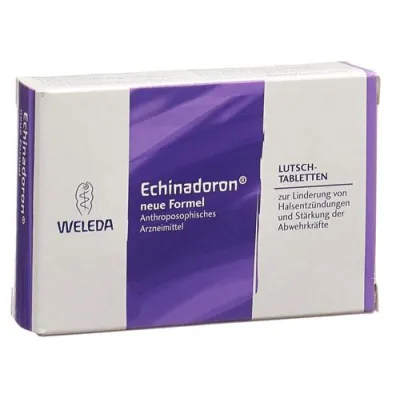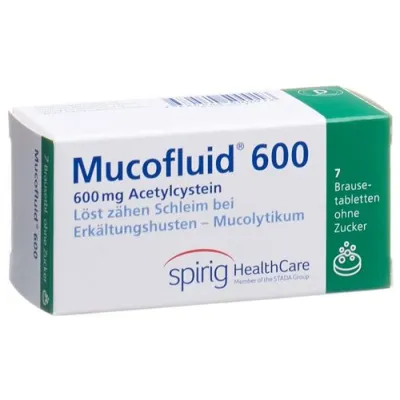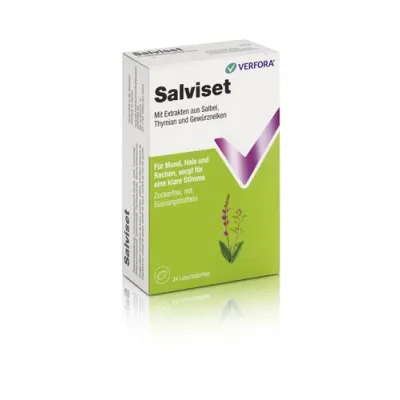Cough and cold
(1 Pages)
Echinadoron new formula lozenges 30 pcs
When is echinadorone used?According to anthroposophical knowledge of man and nature, echinadorone can be used to relieve sore throat and pharynx and to strengthen the body's defenses against colds. Echinadoron can be used to help with susceptibility to colds and flu infections.Echinadoron contains a combination of coneflowers, calendula and chamomile as active ingredients. Eucalyptus oil is included as a refreshing flavor component.What should be considered?If pain, inflammation and fever persist, you should consult your doctor.The lozenges should not be taken for more than 8 weeks without interruption.This medicine contains 1 g of usable carbohydrates per single dose.If your doctor has prescribed other medicines for you, ask your doctor or pharmacist whether echinadoron can be taken at the same time.When should echinadoron not be taken or only with caution?Do not take if you have a known hypersensitivity to one of the ingredients, coneflower (Echinacea), calendula ( calendula), chamomile (Chamomilla) or if you are generally sensitive to daisy family (asteraceae). Do not use in children under the age of 4. If children are susceptible to colds, it is advisable to consult a doctor. For fundamental reasons, echinadorone should not be used in the case of autoimmune diseases, leukemia or multiple sclerosis. Inform your doctor, Pharmacist or druggist or your doctor if yousuffer from other illnesses,have allergies ortake other medicines (including those you bought yourself!).Can Echinadoron be taken during pregnancy or while breastfeeding?Based on previous experience, there is no known risk for the child when used as intended. However, systematic scientific investigations have never been carried out. As a precaution, you should avoid taking medicines during pregnancy and breastfeeding or ask your doctor, pharmacist or druggist for advice.How do you use echinadorone?Adults and adolescents from the age of 12: in the acute phase of the disease every 2 hours, in the healing phase phase 3 times a day, suck 1-2 tablets.Children from 4 years of age: In the acute phase of the disease, 3-4 times a day, in the healing phase 3 times a day, suck 1 tablet. A tingling sensation on the tongue is caused by coneflower and is not unusual. Observe the dosage given in the package insert or prescribed by the doctor. If the desired improvement does not occur when treating a child, he or she should see a doctor.If you think the medicine is too weak or too strong, talk to your doctor, pharmacist or druggist.What side effects can echinadorone have?In rare cases, hypersensitivity reactions (such as skin rashes and very rarely asthma, circulatory reactions) can occur. In this case, the treatment should be interrupted and a doctor consulted.If you notice any side effects that are not described here, you should inform your doctor, pharmacist or druggist.What else needs to be considered?Keep the medicine out of the reach of children. Store at room temperature (15–25 °C) and protected from moisture. The medicinal product may only be used up to the date marked "EXP" on the container. Further information availableAsk your doctor, pharmacist or druggist.What does echinadorone contain?1 lozenge of 1 g contains: 168 mg mother tincture of marigold, fresh herb/104 mg mother tincture of narrow leaves coneflower, whole fresh plant/100 mg mother tincture of chamomile, dried flowers.Excipients: lactose, sugar, calcium behenate, tragacanth, eucalyptus oil.Authorization number65200 (Swissmedic).Where can you get Echinadoron? Which packs are available?Available in pharmacies and drugstores without a doctor's prescription.Packs of 30 lozenges.Authorization holderWeleda AG, Arlesheim, Switzerland.This leaflet was last checked by the Medicines Agency (Swissmedic) in October 2015.26073200 / Index 1..
61.15 USD
Mucofluid effervescent tabletse 600 mg can 7 pcs
Mucofluid contains the active ingredient acetylcysteine. This active ingredient liquefies and loosens the tough, stuck mucus in the airways and promotes expectoration. The secretions present on the lining of the respiratory tract play an important role in defending against inhaled pollutants such as bacteria, dust and chemical contaminants. These irritants are trapped in the secretion, where they are rendered harmless and excreted in the sputum. In infections caused by bacteria and viruses (colds, flu, bronchitis) and in chronic irritation caused by pollutants, mucus production increases. The thickening of the mucus can block the airways, causing difficulty in breathing and sputum. Due to the expectorant effect of Mucofluid, the viscous mucus liquefies and can be coughed up more easily. This reduces the risk of infection. With a clear airway, the coughing subsides and breathing becomes easier. Mucofluid is suitable for the treatment of all respiratory diseases that lead to excessive mucus production, such as colds or flu with cough and catarrh, as well as acute and chronic bronchitis, sinus infections, throat and throat infections, bronchial asthma and (as an additional treatment) cystic fibrosis (cystic fibrosis). Swissmedic-approved patient informationMucofluid®, effervescent tabletsSpirig HealthCare AGWhat is Mucofluid and when is it used? Mucofluid contains the active ingredient acetylcysteine. This active ingredient liquefies and loosens the tough, stuck mucus in the airways and promotes expectoration. The secretions present on the lining of the respiratory tract play an important role in defending against inhaled pollutants such as bacteria, dust and chemical contaminants. These irritants are trapped in the secretion, where they are rendered harmless and excreted in the sputum. In infections caused by bacteria and viruses (colds, flu, bronchitis) and in chronic irritation caused by pollutants, mucus production increases. The thickening of the mucus can block the airways, causing difficulty in breathing and sputum. Due to the expectorant effect of Mucofluid, the viscous mucus liquefies and can be coughed up more easily. This reduces the risk of infection. With a clear airway, the coughing subsides and breathing becomes easier. Mucofluid is suitable for the treatment of all respiratory diseases that lead to excessive mucus production, such as colds or flu with cough and catarrh, as well as acute and chronic bronchitis, sinus infections, throat and throat infections, bronchial asthma and (as an additional treatment) cystic fibrosis (cystic fibrosis). What should be considered?The effect of Mucofluid is promoted by drinking plenty of it. Smoking contributes to the excessive formation of bronchial mucus. By giving up smoking, you can support the effect of Mucofluid. When should Mucofluid not be taken?Mucofluid may be used if there is a known hypersensitivity to the active ingredient acetylcysteine, if you have gastric and intestinal ulcers and if you have a rare congenital metabolic disease (so-called phenylketonuria). , which requires a strict diet, should not be taken. Mucofluid should also not be taken together with cough suppressants (antitussives), as these drugs suppress the cough and the natural self-cleaning of the airways, which impairs the expectoration of the liquefied mucus and congestion of the bronchial mucus with the risk bronchial spasms and respiratory infections. Due to their high active ingredient content, the effervescent tablets must not be used in children under the age of 12 (in children under the age of 6 with the metabolic disease mucoviscidosis (cystic fibrosis)). Mucofluid must not be used on small children under the age of 2 years. Your doctor knows what to do in such cases. When is caution required when taking Mucofluid?The use of Mucofluid, especially at the beginning of treatment, can lead to liquefaction of the bronchial secretion and promote expectoration. If the patient is not able to cough it up sufficiently, the doctor can take supportive measures. If you have experienced rashes or breathing difficulties when previously taking a drug with the same active ingredient as Mucofluid contains, you should definitely inform your doctor or pharmacist before you start taking the preparation. If you suffer from high blood pressure, the Mucofluid effervescent tablets are not suitable for you, as they contain around 1260 mg of sodium bicarbonate per effervescent tablet, corresponding to around 877 mg of table salt. The salt released after ingestion can further increase your blood pressure and reduce the effectiveness of medicines for high blood pressure. The concomitant administration of certain other medicines can lead to an interference with the effect of each other. For example, the effectiveness of certain drugs against circulatory disorders in the coronary vessels (e.g. nitroglycerin for angina pectoris) can be increased. Co-administration of acetylcysteine and carbamazepine can lead to a decrease in carbamazepine concentration. The simultaneous administration of cough suppressants (antitussives) can impair the effect of Mucofluid (see above: «When should Mucofluid not be taken?»). Furthermore, you should not take certain antibiotics at the same time as Mucofluid, but at an interval of at least 2 hours. Your doctor or pharmacist will explain to you which antibiotics this is the case with. Excipients of particular interestSodiumThis medicinal product contains 345 mg sodium (main component of cooking/table salt) per effervescent tablet. This equates to 17% of the recommended maximum daily dietary intake of sodium for an adult. AspartameThis medicinal product contains 15 mg aspartame per effervescent tablet. Aspartame is a source of phenylalanine. It can be harmful if you have phenylketonuria (PKU), a rare inherited disorder in which phenylanine builds up because the body can't break it down enough. SaccharosePlease only take Mucofluid 600 after consulting your doctor if you know that you suffer from a sugar intolerance. Inform your doctor, pharmacist or druggist if you suffer from other illnesses, have allergies or are taking other medicines (even those you bought yourself!) or using them externally! Can Mucofluid be taken during pregnancy or while breastfeeding?Based on previous experience, there is no known risk for the child when used as intended. However, systematic scientific investigations have never been carried out. As a precaution, you should avoid taking medicines during pregnancy or ask your doctor, pharmacist or druggist for advice. There is no information on the excretion of acetylcysteine in human milk. Therefore, you should only use Mucofluid while breastfeeding if your treating doctor deems it necessary. How do you use Mucofluid?Unless otherwise prescribed, the usual dosage is: Adolescents over 12 years of age and adults600 mg daily (1 effervescent tablet of 600 mg). If the excessive formation of mucus and the associated cough do not go away after a treatment period of 2 weeks, you should consult a doctor so that he or she can clarify the cause more precisely and rule out a malignant disease of the respiratory tract, for example. Long-term treatment (on medical prescription only)600 mg daily, divided into one dose. Duration of treatment limited to a maximum of 3-6 months. Cyar fibrosisAs above, but for children from the age of 6, one 600 mg effervescent tablet once a day. Dissolve the effervescent tablets in a glass of cold or hot water and drink immediately. Do not dissolve other medicines with Mucofluid at the same time, as this can impair or nullify the effectiveness of both Mucofluid and the other medicines. When you open the tubes, you can smell a slight smell of sulphur. This is typical for the active ingredient acetylcysteine and does not affect its effect. Follow the dosage given in the package leaflet or as prescribed by your doctor. If you think the medicine is too weak or too strong, talk to your doctor, pharmacist or druggist. What side effects can Mucofluid have?The following side effects can occur when taking Mucofluid: Gastrointestinal disorders such as vomiting, diarrhea, nausea, abdominal pain or inflammation of the oral mucosa, as well as hypersensitivity reactions, hives, headaches and fever. Furthermore, accelerated pulse, low blood pressure and ringing in the ears, heartburn, as well as bleeding and water retention in the face can occur. Allergic symptoms of a general nature (e.g. skin rashes or itching) can also occur. If the hypersensitivity reactions also trigger breathing difficulties and bronchial spasms, which can happen in rare cases, you must stop treatment with Mucofluid immediately and consult a doctor. Breath may temporarily acquire an unpleasant odor. If you get any side effects, talk to your doctor, pharmacist or druggist. This also applies in particular to side effects that are not listed in this leaflet. What else should be considered?Store at room temperature (15-25 °C), protected from light and moisture and out of the reach of children. The medicinal product may only be used up to the date marked «EXP.» on the container. designated date are used. Your doctor, pharmacist or druggist can provide you with further information. These people have the detailed information for specialists. What does Mucofluid contain?1 effervescent tablet contains 600 mg acetylcysteine, excipients: anhydrous citric acid, sodium bicarbonate, macrogol 6000, lemon flavor, tangerine flavor , aspartame (E951), acesulfame potassium, beta-carotene (E 160a), sucrose, riboflavin phosphate sodium, colloidal anhydrous silica. Approval number54450 (Swissmedic). Where can you get Mucofluid? What packs are available?In pharmacies and drugstores, without a doctor's prescription. Tubes of 7 and 14 effervescent tablets. Authorization holderSpirig HealthCare AG, 4622 Egerkingen. This leaflet was last checked by the drug authority (Swissmedic) in December 2019. ..
13.11 USD
Salviset pastilles 24 pcs
Characteristics of Salviset lozenges 24 pcsAmount in pack : 24 piecesWeight: 0.00000000g Length: 26mm Width: 70mm Height: 120mm Buy Salviset lozenges 24 pcs online from Switzerland..
22.69 USD
Sidroga chest and cough tea n 20 bags 2 g
Sidroga Breast and Hustentee N 20 Btl 2g If you're looking for a natural way to support your breast and respiratory health, Sidroga Breast and Hustentee may be the perfect product for you. Each box contains 20 tea bags, each with 2 grams of specially selected herbs to help promote breast health and alleviate symptoms of cough and cold. What's in the tea? Sidroga Breast and Hustentee is made with a carefully blended combination of natural herbs including thyme, aniseed, fennel, and marshmallow root. These herbs have been used for centuries for their beneficial effects on respiratory and breast health. How does it work? The active compounds in the herbs help to soothe the respiratory tract and promote healthy mucus production, which can be particularly helpful when dealing with coughs and colds. Additionally, the breast health benefits of these herbs may help support overall breast health and functioning. How to use To prepare the tea, simply place one tea bag in a cup of boiling water and steep for 5-10 minutes. For best results, drink 2-3 cups per day. The tea is unsweetened and can be consumed as is or with a natural sweetener such as honey or stevia. Why choose Sidroga? Sidroga is a trusted brand with a long history of producing high-quality, natural remedies for a variety of health concerns. The company is committed to using only the finest natural ingredients and employs rigorous quality control standards to ensure that every product is safe and effective. Choose Sidroga Breast and Hustentee N 20 Btl 2g for a natural, effective way to support your respiratory and breast health...
16.08 USD
(1 Pages)




